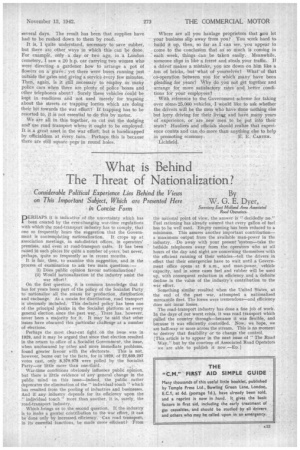What is Behind The Threat of Nationalization?
Page 35

If you've noticed an error in this article please click here to report it so we can fix it.
Considerable Political Experience Lies Behind the Views on This Important "Subject, Which are Presented Here a in Concise Form
By W. G. E. Dyer
Secretary East Midland Area Associated Road Operators.
DERHAPS it Is indicative of the uncertainty which has 1 been created by the ever-changing war-time regulations with which the road-transport industry has to comply, that one so frequently hears the suggestion that the Govern ment is contemplating nationalization. It crops • up at association meetings, in sub-district offices, in operators' premises, and even at road-transport cafes. It has been raised iri such places for quite a number of years, but never, perhaps, quite so frequently as in recent months.
It is fair, then, to examine this suggestion, and in the process of examination to ask two main questions:— (i) Does public opinion favour nationalization?
(ii) Would nationalization Of the industry assist the war effort?
On the first question, it is common knowledge that it has for years been part of the policy of the Socialist Party to nationalize all the means for production, distribution and exchange. As a means for distribution, road transport is obviously included. This declared policy has been one of the principal planks in the Socialist platform at every general election since the past war., There has, however, never been a majority for it. It may be said that other issues have obscured this particular challenge at a number of elections.
Perhaps the most clear-cut fight on the issue was in 1929, and it may be argued that since that election resulted in the return to office of a Socialist Government, the issue, when unobscured by other and more immediate problems, found greater favour with the electorate. This is not, however, borne out by the facts, for in'1929, of 22,639,297 votes cast, only 8,379,978 were polled by the Socialist Party—or little more than one-third.
War-time conditions obviously influence public opinion, but there is little evidence of any general change in the public mind on this issue—indeed, the public rather deprecates the elimination of the " individual touch " which has resulted from the pooling of industries and businesses. And if any industry depends for its efficiency upon the " individual touch " more than another, it is, surely, the road-transport industry. Which brings us to the second question. If the industry is to Make a greater contribution to the war effort, it can be 'done only by increased. efficiency. Can road transport, in its essential functions, be made more efficient? From the national point of view, the answer is "decidedly no." Fuel rationing has already assured that every gallon of fuel has to be well used. Empty running has been reduced to a minimum. This assures another important contribution— a maximum output from the available man-power in the industry. Do away with your present system—take the bedside telephones away from the operators who at all hours of the day and night are concerning themselves with the efficient running of their vehicles—tell the drivers in effect that their emergencies have to wait until a Government office opens at 9 a.m., and man-power, vehicle capacity, and in some cases fuel and rubber will be used up, with consequent reduction in efficiency and a definite" decline in the value of the industry's contribution to the
war effort.
Something similar resulted when the United States, at the end of the past war, attempted a nationalized mercantile fleet. The losses were tremendous—and efficiency does not incur losses,
The road-transport industry has done a fine job of work. In the days of our worst crisis, it was road transport which pulled the country through—because it was flexible, and because it was efficiently controlled. Now; we hope, we are half-way or more across the stream. This is no moment to destroy that flexibility or to change the control. [This article is to appear in the next issue of "The Road Way." but by the courtesy of Associated Road Operators we are able to publish it now.—ED.1




















































